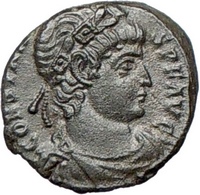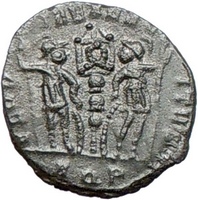Constans 337-350AD Ancient Roman Emperor Coins for
Sale Online of Constantine the Great's Son
Buy coins of Constans, son of Constantine the Great online today. Read
his biography and watch a video presentation about the emperor by
trusted coin dealer, Ilya Zlobin. Every coin comes with it's own
custom-made, unique certificate of authenticity $50-$100 value,
absolutely free, a lifetime guarantee of authenticity, professional
research photograph and history. The best value at an online coin shop
you will find! You can also explore explore a selection of thousands of
certified authentic ancient Greek, Roman, Biblical, Byzantine coins,
artifacts and beyond at a trusted eBay online coin shop. A fun way to
learn about and preserve history for future generations. Ancient coins
make a great gift, investment and collection all in one.


Example of Authentic Ancient
Coin of:
Constans - Roman Emperor: 337-350 A.D. -
Bronze AE3 Aquileia mint circa 337-350 A.D.
Reference: RIC VIII 26
CONSTANS PF AVG, laurel and rosette diademed, draped & cuirassed bust
right
GLORIA EXERCITVS, two soldiers holding spears and shields with one
standard between them.
Wreath on banner. Mintmark AQP.
 Flavius
Julius Constans (320-350) was a
Roman Emperor who ruled from 337 until
his death. Constans was the third and youngest son of
Constantine the Great and
Fausta, Constantine's second wife. Flavius
Julius Constans (320-350) was a
Roman Emperor who ruled from 337 until
his death. Constans was the third and youngest son of
Constantine the Great and
Fausta, Constantine's second wife.
On 25 December 333 Constantine elevated Constans to
Caesar.
In 337 he succeeded his father, jointly with his
older brothers
Constantine II and
Constantius II, receiving
Italy,
Pannonia and
Africa as his portion. Constantine II,
who ruled over Gaul, Spain and Britain, attempted to take advantage of
his youth and inexperience by invading Italy in 340, but Constans
defeated Constantine at
Aquileia, where the older brother died.
The invasion was the effect of brotherly tensions between the two
emperors. Constantine II was, at first, Constans's guardian. As Constans
grew older, Constantine II never relinquished that position.
In 341-2, Constans led a successful campaign against
the
Franks and in the early months of 343
visited
Britain. The source for this visit,
Julius Firmicus Maternus, does not give
a reason for this but the quick movement and the danger involved in
crossing the
channel in the dangerous winter months,
suggests it was in response to a military emergency of some kind,
possibly to repel the
Picts and
Scots.
Regarding religion, Constans was tolerant of Judaism
but promulgated an edict banning pagan sacrifices in 341. He suppressed
Donatism in Africa and supported
Nicene orthodoxy against
Arianism, which was championed by his
brother Constantius the latter. Constans called the
Council of Sardica, which
unsuccessfully tried to settle the conflict.
In 350, the general
Magnentius declared himself emperor
with the support of the troops on the
Rhine frontier, and later the entire
Western portion of the Roman Empire. Constans lacked any support beyond
his immediate household, and was forced to flee for his life.
Magnentius' supporters cornered him in a fortification in Helena,
southwestern
Gaul, where he was killed by
Magnentius's assassins.
|